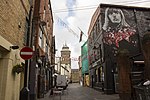Welsh Sports Hall of Fame
The Welsh Sports Hall of Fame (WSHOF) is a charitable organisation created to commemorate the sporting achievements and preserve the artefacts of Welsh athletes. It was established in 1980 from the memorabilia collection of Welsh radio commentator G. V. Wynne-Jones. Since 1990, inductees to the exclusive "Roll of Honour" have been chosen annually by a trustees committee comprising representatives from athletics, media, universities and museums. The organisation has also given awards to individuals for outstanding contribution to Welsh sport. In 2018 an extra award was added to commemorate the former chairman, Rhodri Morgan. The first 'Rhodri' was awarded to the City of Cardiff for their outstanding service and commitment to sporting excellence.
Excerpt from the Wikipedia article Welsh Sports Hall of Fame (License: CC BY-SA 3.0, Authors).Welsh Sports Hall of Fame
Westgate Street, Cardiff Castle
Geographical coordinates (GPS) Address Website Nearby Places Show on map
Geographical coordinates (GPS)
| Latitude | Longitude |
|---|---|
| N 51.478258333333 ° | E -3.1825805555556 ° |
Address
Principality Stadium
Westgate Street
CF10 1NS Cardiff, Castle
Wales, United Kingdom
Open on Google Maps








